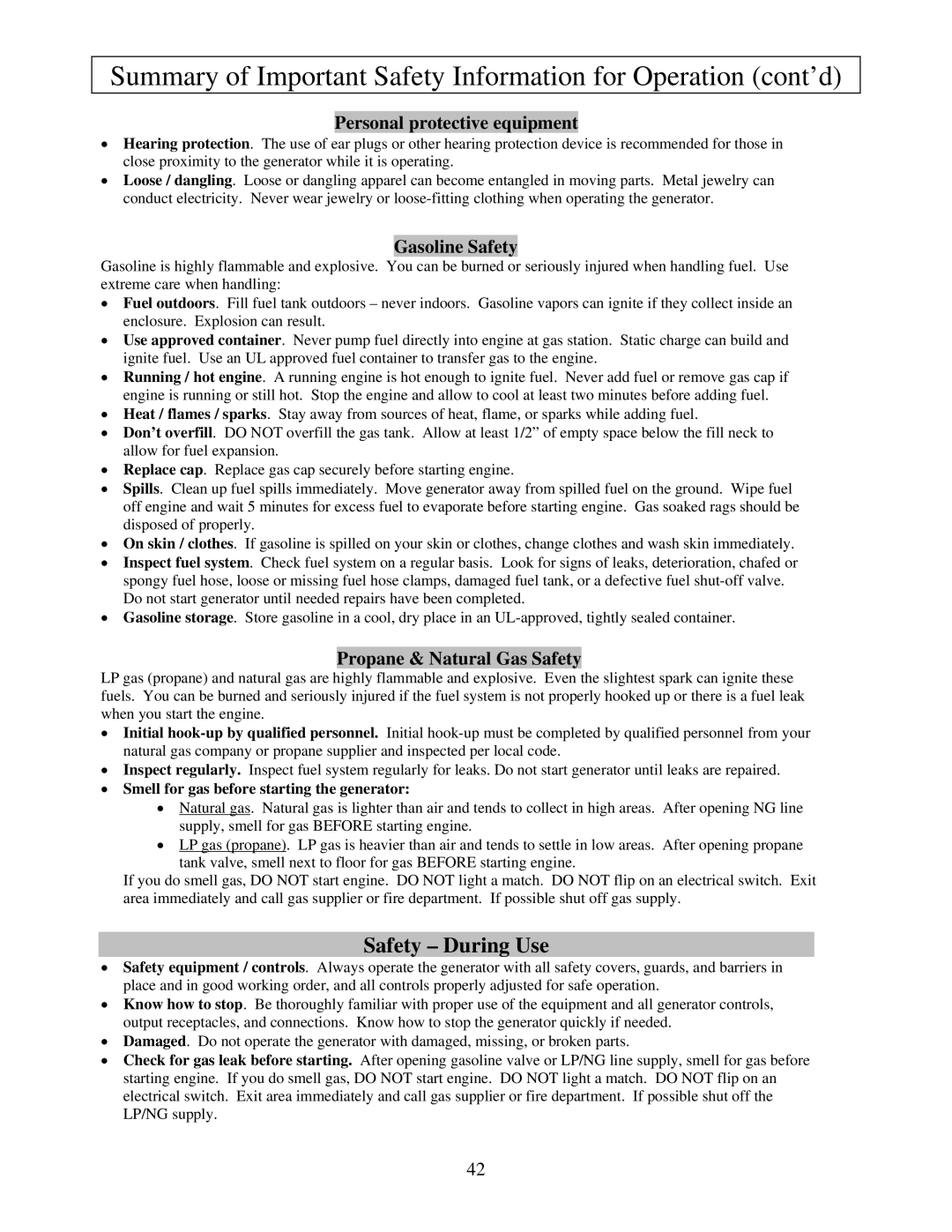
Summary of Important Safety Information for Operation (cont’d)
Personal protective equipment
•Hearing protection. The use of ear plugs or other hearing protection device is recommended for those in close proximity to the generator while it is operating.
•Loose / dangling. Loose or dangling apparel can become entangled in moving parts. Metal jewelry can conduct electricity. Never wear jewelry or
Gasoline Safety
Gasoline is highly flammable and explosive. You can be burned or seriously injured when handling fuel. Use extreme care when handling:
•Fuel outdoors. Fill fuel tank outdoors – never indoors. Gasoline vapors can ignite if they collect inside an enclosure. Explosion can result.
•Use approved container. Never pump fuel directly into engine at gas station. Static charge can build and ignite fuel. Use an UL approved fuel container to transfer gas to the engine.
•Running / hot engine. A running engine is hot enough to ignite fuel. Never add fuel or remove gas cap if engine is running or still hot. Stop the engine and allow to cool at least two minutes before adding fuel.
•Heat / flames / sparks. Stay away from sources of heat, flame, or sparks while adding fuel.
•Don’t overfill. DO NOT overfill the gas tank. Allow at least 1/2” of empty space below the fill neck to allow for fuel expansion.
•Replace cap. Replace gas cap securely before starting engine.
•Spills. Clean up fuel spills immediately. Move generator away from spilled fuel on the ground. Wipe fuel off engine and wait 5 minutes for excess fuel to evaporate before starting engine. Gas soaked rags should be disposed of properly.
•On skin / clothes. If gasoline is spilled on your skin or clothes, change clothes and wash skin immediately.
•Inspect fuel system. Check fuel system on a regular basis. Look for signs of leaks, deterioration, chafed or spongy fuel hose, loose or missing fuel hose clamps, damaged fuel tank, or a defective fuel
•Gasoline storage. Store gasoline in a cool, dry place in an
Propane & Natural Gas Safety
LP gas (propane) and natural gas are highly flammable and explosive. Even the slightest spark can ignite these fuels. You can be burned and seriously injured if the fuel system is not properly hooked up or there is a fuel leak when you start the engine.
•Initial
•Inspect regularly. Inspect fuel system regularly for leaks. Do not start generator until leaks are repaired.
•Smell for gas before starting the generator:
•Natural gas. Natural gas is lighter than air and tends to collect in high areas. After opening NG line supply, smell for gas BEFORE starting engine.
•LP gas (propane). LP gas is heavier than air and tends to settle in low areas. After opening propane tank valve, smell next to floor for gas BEFORE starting engine.
If you do smell gas, DO NOT start engine. DO NOT light a match. DO NOT flip on an electrical switch. Exit area immediately and call gas supplier or fire department. If possible shut off gas supply.
Safety – During Use
•Safety equipment / controls. Always operate the generator with all safety covers, guards, and barriers in place and in good working order, and all controls properly adjusted for safe operation.
•Know how to stop. Be thoroughly familiar with proper use of the equipment and all generator controls, output receptacles, and connections. Know how to stop the generator quickly if needed.
•Damaged. Do not operate the generator with damaged, missing, or broken parts.
•Check for gas leak before starting. After opening gasoline valve or LP/NG line supply, smell for gas before starting engine. If you do smell gas, DO NOT start engine. DO NOT light a match. DO NOT flip on an electrical switch. Exit area immediately and call gas supplier or fire department. If possible shut off the LP/NG supply.
42
